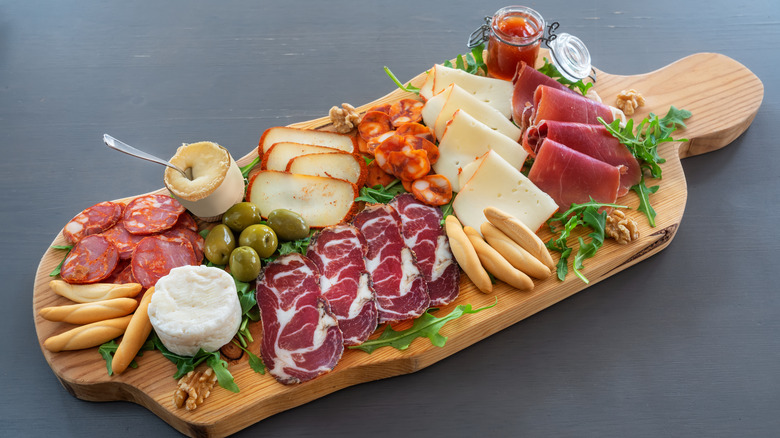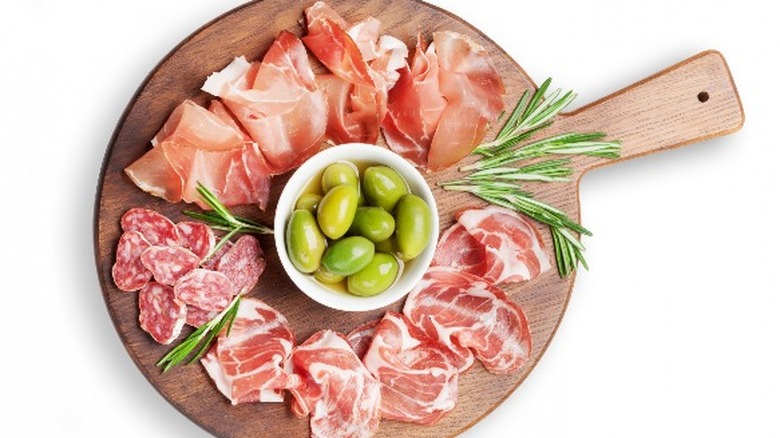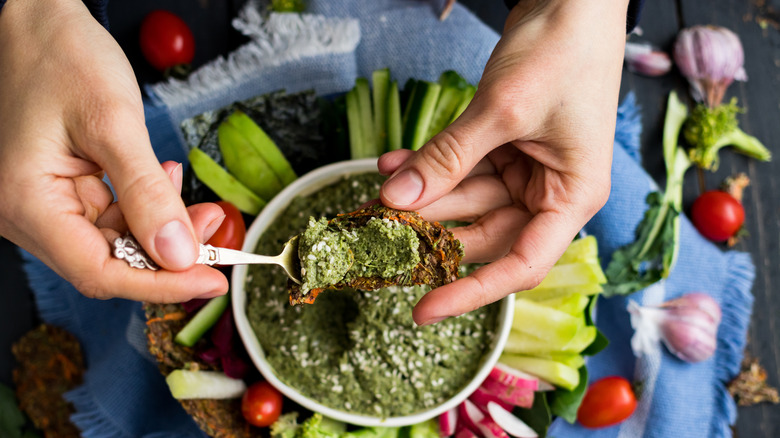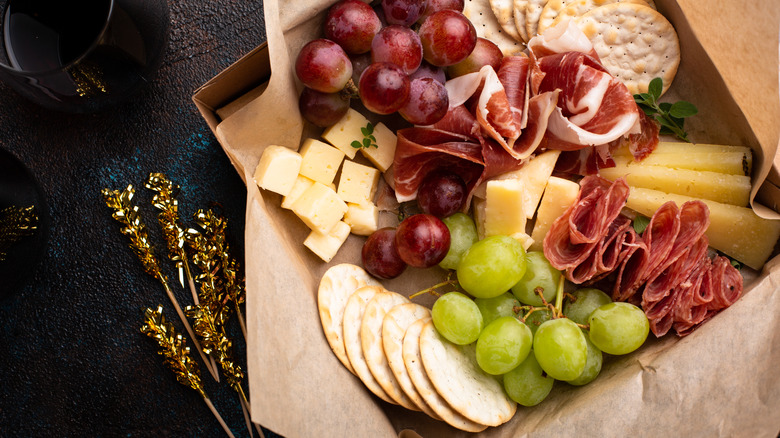These Simple Rules Make Charcuterie Boards A No-Brainer
If you haven't hopped on the charcuterie bandwagon yet, you're really missing out. Charcuterie boards have always been around, but in recent years they've risen in popularity and are today considered a wine pairing staple. For those that might not be familiar with the snack board, it typically abides by the following checklist of included items: cured meats like prosciutto, a wide selection of cheeses, something sweet like jam, textural elements like crackers, and sometimes pickled foods such as olives (via Food Network).
Compared to other finger food pairings, charcuterie boards reign supreme for a multitude of reasons. For starters, they're 100% customizable. Not in the mood for fruit? Skip it. Olives not really your thing? Throw in extra nuts or grapes or pile on the cheeses instead. Similarly, these boards are a lot easier to share with a group than say chips and dip where, more times than not, double dipping is involved. Before you start mapping out the charcuterie board of your dreams, however, there are five components or rules you should take into consideration when selecting your options to make your board a success every time.
Opt for pre-sliced and ready-to-cut meats
According to Fix.com, there are two meat components that a charcuterie board must have: pre-sliced and ready-to-cut meats. Depending on whether your charcuterie board will be served as a snack or the main event, it's recommended that you offer two to five ounces of meat per person, says the source. The meat selection is up to you and your guests, but it's ideal to have a healthy balance of crudo (raw and cured) and cotto (cooked) meats to help even out all the different flavors and textures.
Examples of pre-sliced meats include prosciutto and jamón Ibérico, both of which are known for their salty, air-dried taste; lomo, a Spanish cured tenderloin; bresaola, a beef version of prosciutto; and speck, which is German smoked pork shoulder. Ready-to-cut meats (i.e. hard salami, soppressata, smoked sausage, capicola, and finocchiona) are harder meats that have a sweet or spicy zing to them. Whereas sliced meats are shaved very thin and served flat or loosely rolled, ready-to-cut meats should be cut to resemble the same width and size as crackers, says Fix.com
Pick at least one spread
Onto the next rule: spreads. While Fix.com suggests sticking with a meat-based spread, there are other vegetarian alternatives you could add to your board, too. For meat-based spreads, try smooth or chunky pâté or rillettes, which is shredded, slow-cooked, fatty meat mixed with seasonings. If you love pâté, you might also like terrine, a hearty combo of thick meat, vegetables, and seasonings.
Other spreads you can incorporate on your charcuterie board are basil or sun-dried pesto, olive tapenade, beetroot spread, or garlicky hummus (or any flavor you like). For a bland palette cleanser, include extra virgin olive oil and balsamic vinegar, says Eat Cured Meat. Those who enjoy out-of-the-box pairings may like some honey, spreadable figs, grainy mustard, or chutney as the spread component, notes Food Folks and Fun. The amount and number of spreads you select is a personal choice. If you know the group is a bigger fan of meats and cheeses, one larger size spread may be sufficient.
Add bite-sized snacks or accents
This is the fun part! Those smaller finger foods, or "accents" as Fix.com adorably calls them, can be anything from olives to sliced fruit (think grapes, apples, berries, or melons) to even jam. It's not uncommon to see more of one than the other, you can make it any way you please after all. However, breads, crackers, and cheeses are typically the favorites. One could argue, they're just as beloved as the meat. It's best to incorporate a variety of artisan breads and crackers to compliment the cheese and provide some crunch.
Choosing the cheese for your board can be very overwhelming because there's so many different options. According to Food Folks and Fun, one way to make the process easier but still robust is to select one kind of cheese from each of the four main categories: aged, blue, soft, and firm. Aged cheese examples are cheddar, gouda, and comté while popular blue cheeses are gorgonzola and stilton. Camembert and goat cheese are two soft cheese examples. For firm cheese, try parmesan or Parmigiano Reggiano.
Finally, pick the perfect drink
Charcuterie boards are often associated with wine, but Fix.com points out that charcuterie boards pair just as well with beer and non-alcoholic fizzy drinks as they do with vino. Beer lovers will want to stay within the wild ale, saison, and porter vicinity to match the palette. If your goal is to compliment the taste and texture of the beer to the meats and cheeses, these three styles are your best bet.
Wine and charcuterie go together like peanut butter and jelly so you really can't go wrong with what you pick. However, FIx.com suggests Pinot Noir, Prosecco, Lambruscos, and off-dry Rieslings. For an in-depth meat, cheese, and wine pairing list, check out Wine Insiders for suggestions.
Fizzy or sparkling drinks are also a fun match. Though, keep in mind that flavored drink will be paired with meats, cheeses, jams, etc. so it may be smart to stick to non-flavored fizzy water. You can also add freshly sliced lemon or lime to spruce it up. With these few simple steps, you'll have the perfect charcuterie board for every dinner party.




